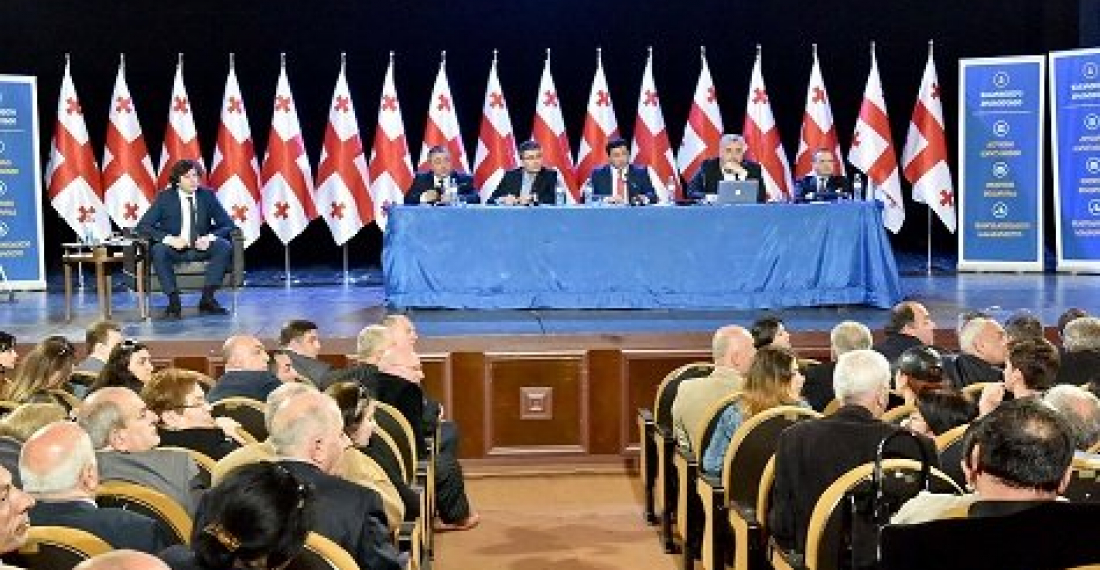This is a commentary prepared by the editorial team of Caucasus Concise
A nation-wide consultation was recently launched in Georgia to discuss a raft of amendments to the country's constitution. A constitutional commission, chaired by the Speaker of the Georgian Parliament, Irakli Kobakhidze, last month agreed to put forward a package of 43 measures which, if adopted, will have considerable impact on the country's system of governance. The Constitution aspires to give Georgia a system of government based on the principles of "strong parliament, capable government, non-partisan president and independent judiciary".
Whilst some of the proposals are more declaratory - for example by embedding in the constitution the country's European and Euro-atlantic aspirations, and formalising the link with the Georgian overseas diaspora, many of the amendments impact directly the operation of the country's institutions. The proposals take forward a Georgian Dream committment to define marriage as a union between man and woman.
Observers think that the government with the proposals has sought to bring together those elements that seek more reforms, civil rights and european integration with the more conservative elements of society, and in its approach the new constitution tries to strike a balance between both. Whilst the marriage definition has been condemned by some gay rights groups, a number of guarantees to individual rights and freedoms have been widely welcomed.
Observers of the Georgian political scene have been measuring the proposals against the need to enshrine a system of checks and balances in the Georgian political system. In this regard they have welcomed the proposal that would allow the setting up of parliamentary investigative committees at the request of only one third of MPs. Similarly, a vote of no-confidence in the government will now only require a simple majority to pass. There are also provisions that add to transparency and accountability in the appointment and performance of the Prosecutor-General, and the Prosecutor's Office, making it independent from executive power.
The amendments that are proving more controversial are related to the Office of the President and the elections. In the last years of the Saakashvili government, the Georgian constitution was changed to turn the country into a parliamentary republic. The powers of the President were transferred to the prime minister. The President at present has only a few symbolic powers. But he remains elected by popular vote, giving the office holder considerable moral authority. The current amendments propose having the president elected by parliament - not an unusual situation in countries where the president has little power, but a move that has been strongly resisted by the current incumbent Giorgi Marghvelashvili, who sees them as an attempt to remove the possibility that the president acts as a counterweight to the executive branch of government. If approved the changes to the election of president will only come into effect after the next president is elected by popular vote under the present rules, but many Georgians remain ambivalent about the parliamentary system, so the issue is broadly debated.
The biggest discussion is however centering around the election rules, with political parties and ngos engaging in a heated discussion on where things should go.
A new measure eliminates the single seat constituencies - the so called "majoritarians". All MPs will henceforth be elected through a nation-wide party list. This measure is a two-edged sword for both government and opposition. Georgian governments of different political shades in the past benefited from this system. Majoritarian MPs tended to come from the governing party, or to support it if elected on an independent ticket. By eliminating them the government may be seen adopting a progressive measure that is against its own interest. But opposition parties accuse the government of cutting a direct link between constituencies and parliament and say the new system will be easier for the government to manipulate.
The new constitutional draft keeps the 5% threshhold for securing seats in parliament. This has been condemned by a number of smaller parties, but the government says it discourages political fragmentation. Even more controversial is another measure that provides for the votes of those parties that do not pass the 5% threshold to revert to the party holding the highest number of votes. This the government says is important to ensure that whoever wins has a stable majority to govern and avoid the risk of instability. The opposition is not convinced, and many parties are now calling for a referendum to let the people have the final say.
The Georgian Dream government has enough seats in parliament to enable it to force through the constitutional changes and adopt them with 2/3 majority if it wants to. It has so far moved cautiously with the constitutional changes, and has sought the advice of the Venice Commission on a number of issues, including areas that involve the selection of the judiciary. It should however remain in listening mode and continue to seek as much consensus as possible on as many measures as possible. In the end Georgian society needs to be convinced that the constitutional changes improve the country's governance and add to the process of democratic state-building, and are not being adopted to serve some short term political project.
This commentary was preparedby the editorial team of Caucasus Concise, a weekly electronic newsletter published in association with comonspace.eu







